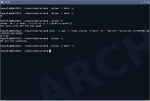Another console timekeeper for the W section: wtime. And this one is particularly closemouthed.
wtime has about six possible options: Start, stop, target a particular task (otherwise it uses “default”), show how many seconds have elapsed since the start, and sum the time spent on the task between a start and finish date.
Aside from that, wtime has very little to say for itself.
Now I know, that as a resourceful and enterprising young Linux devotee, you see a lot more potential in wtime than just something that spits out seconds since a start marker.
And I know you’ve already come up with a solution for translating wtime’s rather clunky output to a clean hours-minutes-seconds display.
No? You haven’t? You mean you want to see my suggestion? Okay, here’s one I’m borrowing, with a tiny adjustment, from Jaidu Saikia.
kmandla@6m47421: ~/downloads/wtime$ echo - | awk -v "S=$(./wtime -c)" '{printf "%d:%d:%d",S/(60*60),S%(60*60)/60,S%60}'
0:10:11
awk to the rescue, it seems. 😉
If you hadn’t gleaned the info from the screenshot or the help pages, you can manage more than one task at a time. It does require you to prefix every command with the -t flag though, otherwise you’ll fall back to “default.” I see how and why this happens, but I’m sure there are better ways to handle it.
wtime is not in Arch/AUR or Debian. It’s a free-roaming program!
wtime doesn’t talk much, it’s a little cumbersome for multiple tasks and the output it gives is somewhat rudimentary. I don’t deny it works, but it has that exceptionally sparse feel, like a homework project or a tiny tool just for the author’s purposes.
With a little creativity you can get it going in a usable state, but with so many other options for time trackers and work logs, I have a feeling wtime will be quickly eclipsed.
